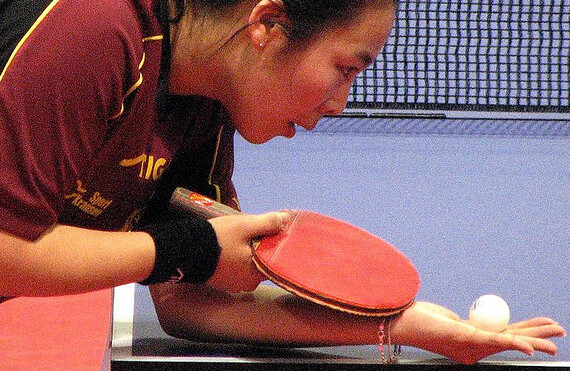While sports fans across the globe get their foam fingers, piercing whistles, air horns, flags, face paint, and homemade signs ready for the Olympic Games this summer, China is training its spectators in cheering, clapping, and how to handle the occasional volleyball that flies into the stands. Mannered reactions are the goal—China is gunning for a perfect ten in Olympic hosting.
In the Chinese capital, the "Beijing Civilized Workers Cheering Squad" promotes sportsmanlike spectatorship and is part of a wider campaign to discourage spitting, littering, cutting in line, and swearing. There are handbooks on Olympic sports and etiquette, reports the Associated Press, and videos of cartoon characters roaming stadiums to berate fans for misbehavior. Preapproved cheers have been developed, including "Zhongguo, Zhongguo—ha, ha, ha. Zhongguo, Zhongguo bi sheng, Jia you, jia you." It roughly translates to "China, China—ha, ha, ha. China, China must win. Let's go, let's go."
Beyond making a good impression on the international playing field, China may be working to quell its own nascent sports hooliganism. In 2004, fans became belligerent after China's soccer team lost to Japan in the final of the Asian Cup. In 2005, fans became agitated, to the point of brawling, at a basketball game between China and Puerto Rico.
The Games have been promoted under the vision of "One World, One Dream"—China's attempt to set a good global track record. The theme highlights the Chinese belief that "peace and progress, harmonious development, living in amity, cooperation and mutual benefit, and enjoying a happy life are the common ideals of the people throughout the world." On the domestic front, China's strategic principles behind the Games will drive modernization, improve living standards, and promote social civility and opening-up.
China hopes the Olympics will provide "a unique opportunity where the East meets the West." But, hey, capitalizing on home field advantage to win the most gold medals wouldn't be so bad either.
![]() This article is licensed under a Creative Commons License.
This article is licensed under a Creative Commons License.
Please read our usage policy.




